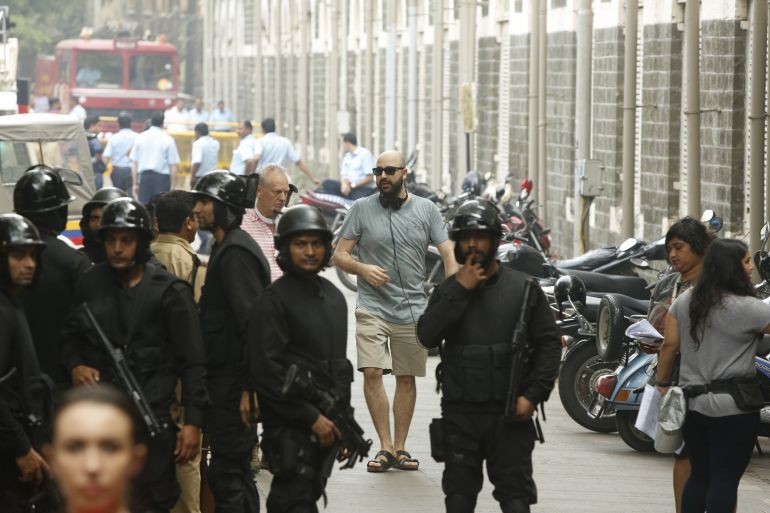Anthony Maras (centre) in Mumbai.
Anthony Maras has sat in on numerous screenings of his debut film Hotel Mumbai, including test screenings in Los Angeles, the world premiere in Toronto and the Adelaide Film Festival, and the responses have been uniform.
Some people say they want to go home and hug their children, some say it will take a while to process what they have seen, and some are moved to tears.
“It is an emotional experience,” the director, who co-wrote the thriller with John Collee, tells IF. Asked how he feels as he awaits the 260-plus screen launch on Thursday, he says: “Relieved….and fingers’ crossed.”
It will be the widest ever release by Icon Film Distribution. “Exhibitor support has been amazing,” says Dendy Icon group head of marketing Scott Mota.
The US distributor Bleecker Street, which acquired the rights in partnership with ShivHans Pictures after The Weinstein Co. (TWC) filed for bankruptcy, will open the film in Los Angeles and New York on March 22, expanding a week later to around 800 screens.
The director is in the US to promote the release and to take part in a session on Hotel Mumbai as a case study in international co-productions and marketing at the Australian International Screen Forum in New York.
Produced by Basil Iwanyk, Gary Hamilton, Mike Gabrawy, Julie Ryan, Andrew Ogilvie and Jomon Thomas, the thriller was inspired by Surviving Mumbai, a documentary produced by Electric Pictures’ Ogilvie.
Arclight’s Hamilton approached Ogilvie with the idea of making a feature film about the 2008 attack by terrorists that killed more than 160 people. Maras came aboard and he enlisted Collee, who was on the jury which awarded the prize for best Australian short fiction film at the 2011 Sydney Film Festival to Maras’ The Palace.
Maras and Collee spent a year on research in India, talking to survivors of the siege including the hotel chef Oberoi, guests and cops. “I just felt more compelled than ever to tell the story,” the director says.
‘Hotel Mumbai’
The key cast signed on after reading the first draft. The part of Arjun, a heroic waiter, was written specifically for Dev Patel. Armie Hammer, whom Maras had admired since The Social Network, and Iranian/British actress Nazanin Boniadi were cast as Dave and Zahra, a wealthy American couple.
Maras was convinced Boniadi was right for the role after watching a YouTube video of an impassioned speech she gave as a spokeswoman Amnesty International before he had seen her work in the TV series Homeland and Scandal.
Tilda Cobham-Hervey, whose debut film, Sophie Hyde’s 52 Tuesdays much impressed Maras, plays the couple’s nanny. Tilda’s follow-up film One Eyed Girl was directed by Nick Remy Matthews, who was the DOP on Hotel Mumbai.
The cast included Bollywood superstar Anupam Kher as Oberoi and Jason Isaacs as a womanizing Russian businessman.
Arclight Films pre-sold the film widely, which, says Maras, “was a huge vote of confidence.” The film was shot in 2016 and early 2017. International distributors agreed to delay the release while a new US deal was negotiated. “It was a relief to get out” of the TWC logjam, he says.
The only hitch has been a court case filed in the Bombay High Court by South Asian distributor Plus Holdings, alleging its agreement for the Indian rights was cancelled illegally in favour of a deal with Netflix. Last week Variety reported an arbitration court in Singapore has begun a hearing, there is no decision yet and Netflix has shelved plans to screen the film in India.
‘Hotel Mumbai’
Maras is repped in the US by Verve Entertainment’s Adam Levine (Collee’s agent), who signed him after seeing The Palace, the saga of a Greek-Cypriot family that flees invading Turkish forces in 1974, seek refuge and are discovered by a Turkish-Cypriot army conscript.
He has been sent quite a few scripts and regards several as promising. He’s also writing a script for a feature which he had begun before Hotel Mumbai.
“It will be a fair few months before I am ready to put that script to the market,” he says. “I look forward to getting back behind the camera.”





